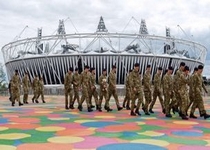The letter to the Guardian in full:
The opportunity to promote peace and internationalism through the Olympics is not completely lost. A coalition of social justice, peace, faith and community groups, under the banner 100 Days of Peace, have been working for over two years to engage schools and local communities in peace-building leading up to and beyond the Games themselves. The 'hot potato' of this project has been the problem of challenging the militarisation of the Games, as highlighted by Seumas Milne. One aspect not mentioned in his article is the role that has been given to hundreds of members of the armed forces during the Games in the welcome and victory ceremonies.
At what is arguably one of the largest international gatherings we will host, we feel that the presence of the armed forces in ceremonial dress will give a very nationalistic, militaristic and insensitive message. Is this showcasing more reflective of the government's attempt to affirm and promote its role at a time when our ongoing involvement in war and conflict is increasingly unpopular?
If the promotion of peace and service are aims of Locog, then why not involve inspirational people and volunteers from other services, nurses, teachers, community organisers, international peacemakers, the fire-service and so on, in these high-profile ceremonies? This might better reflect the UK-sponsored UN resolution for a truce in all the world's conflicts throughout the duration of the Olympic and Paralympic Games. It states that sport 'can and does help mend broken communities, rebuild trust, rediscover self-respect and foster the values at the core of our common humanity'.
Pat Gaffney Pax Christi international Catholic movement for Peace Barbara Kentish, Fr Joe Ryan Westminster Diocese Justice & Peace Commission




